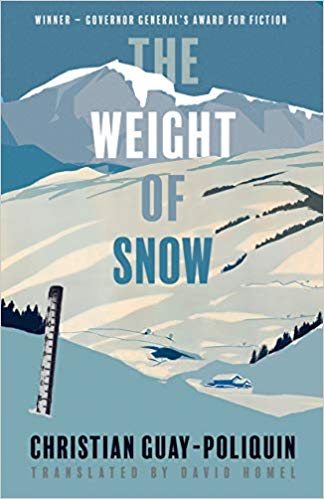Daniel Haeusser reviews short works of SFT that appear both online and in print. He is an Assistant Professor in the Biology Department at Canisius College, where he teaches microbiology and leads student research projects with bacteria and bacteriophage. He’s also an associate blogger with the American Society for Microbiology’s popular Small Things Considered. Daniel reads broadly in English and French, and his book reviews can be found at Reading1000Lives or Skiffy & Fanty. You can also connect with him on Goodreads or Twitter.
 translated by David Homel
translated by David Homel
March 25, 2019
240 pages
grab a copy here or through your local library or independent bookstore
As much of the United States hunkers down for winter and people remain isolated due to a pandemic, there couldn’t be a more atmospherically-fitting novel than The Weight of Snow by Christian Guay-Poliquin, translated from the French by David Homel. A claustrophobically tense novel of deceptive simplicity, its stark plot and captivating language cuts into readers like an icy wind. Like one just traveling through a blizzard, you are left a little disoriented, uncertain of all the details you just observed, and realizing there are likely little details you may have missed hidden in the white emptiness, or in that silence, but for the howls of chilled wind. Like a Gene Wolfe novel, The Weight of Snow is carefully crafted and benefits from rereads.
You may recall Christian Guay-Poliquin’s name from Rachel’s review here of his first novel a few years back, Running on Fumes. The Weight of Snow (originally published in Québec as Le poids de la neige the year that Talonbooks released the English translation of his first novel in the US) technically is a direct sequel to Running on Fumes. They feature the same unnamed narrator who has travelled across a vaguely post-apocalyptic landscape in search of his father. Electricity is gone, cities are under military control, and long-distance communication is impossible.
That speculative setting becomes even more subtle in The Weight of Snow as the narrator becomes isolated on an even smaller scale. While returning to his home village to find his father, the narrator becomes severely injured in a car accident. And a fierce winter is already starting to bear down upon the landscape.
Overwhelmed with their own issues of survival, the isolated village has little room or resources for the injured narrator. A nurse named Maria and other village leaders therefore deliver the narrator to the care of Matthias, an elderly, cantankerous man who has also taken refuge in the village, within an abandoned home at the edge of town. Matthias begrudgingly accepts, only through the promise of getting priority for a convoy to the city where his wife is recovering in a hospital.
As in Running on Fumes, other characters visit the house, flitting in and out with morsels of news regarding the village and world beyond. Bearing New Testament names all, they exist also in symbolic roles, though the correspondence was not always completely clear to me. However, the majority of the novel exists of just Matthias and the narrator, two characters cooped up together who want no part of each other, gradually trapped by ever-increasing amounts of snow that pile up outside. In this literary version of the “Mountain of Madness” episode of The Simpsons, chapters become denoted not according to synchronicity, but according to the snowy depths that trap the men within with only one another.
Despite being the curmudgeon, Matthias cannot abide the silence of a companion. Matthias talks, trying to draw the narrator into conversation, but the narrator’s condition and pain – or temperament – leave him willingly mute. Matthias continues his daily regimens, including his austere cooking: thick horrible coffee, molasses-laden black bread, or the special occasion fruit-cakesque version of the bread. The narrator observes his companion, their situation, and the changing weather that surrounds.
The tension builds gradually among the silence and the winter climes. Nothing seems to be happening, and only shallow coatings of snow accumulate, but simmering under the surface is the sense that something will explode, that a blizzard is due. Yet also, gradually, the narrator begins to open up, as does Matthias. Even brought to the brink of mistrust, anger, and violence against one another, they are forced into an intimacy and tensions even give way to human affection.
Throughout, the novel demonstrates a raw beauty: of language, of human interaction, of environment. It renders the apocalyptic (and post-apocalyptic) into mood. By its end, the reader is left with small advancements in the overall plot that may have been forgotten: the narrator finding his father. How much of what has gone on is real, or how much is existential? One cannot be sure. But I am sure I’ll return to this novel, next time perhaps in the original French.
